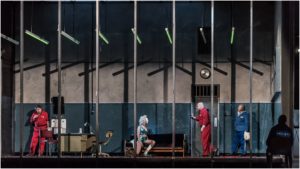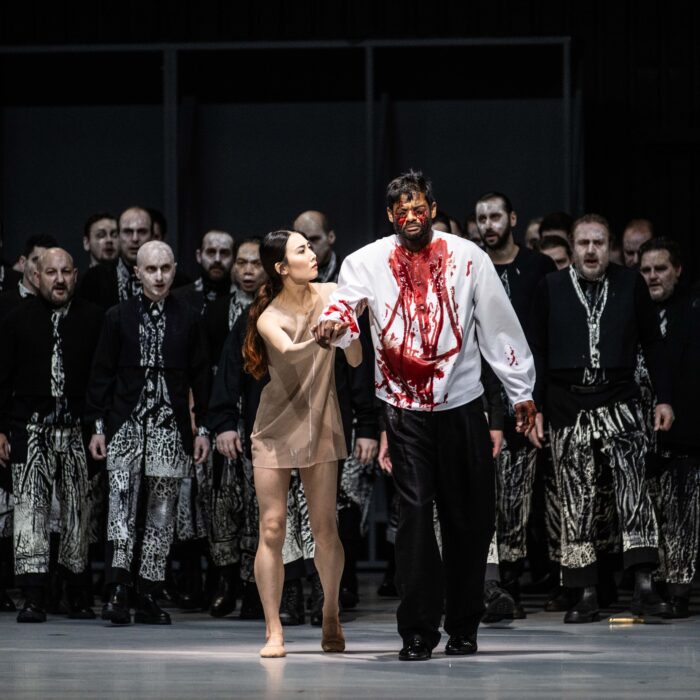
Royal Opera House 2017-18 Review – From the House of the Dead: Prison Drama Locks Up Its Singers
By Sophia LambtonJanáček’s final opera, “From the House of the Dead (Z mrtvého domu),” is among the operatic canon’s most insular works. Set in a Siberian prison camp, the piece is uncharacteristic as an opera from several perspectives: it features just a single female voice – although originally a mezzo sang the tenor role; its setting is confined to the lugubrious complexion of a jail, restricting a production’s color palette to a tenth of what a classic opera’s could be. Most surprisingly of all, the distribution of its vocal lines makes it appear far more of an ensemble piece than most works with their hierarchically positioned roles.
In short, the work is almost like a play of outpourings of monologues and dialogues channeled through music rather than through speech.
But the Royal Opera House’s first-ever production of this opera disregards even the opportunity to centralize the piece’s unexpected intimacy. Together with the setting, “From the House of the Dead’s” constant back-and-forth exchanges, jibes, accusations, and admissions easily accredit its director countless means through which to stage a trenchant, touching, smaller-scale, play-like production.
Adding More Than Necessary
Instead, director Krzysztof Warlikowski exploits other-worldly means to hammer home the opera’s concept – “‘otherworldly” in the opera sense, that is. While Janáček’s libretto, based on Dostoyevsky’s novel of (almost) the same name, is suffused with references of prisoners’ suffering and the immoral treatment which they must endure at their guards’ hands, it seems that Warlikowski chooses to go in a vastly different direction feels that either the composer didn’t manage to sufficiently express these themes both in his music and libretto. Or perhaps its audience – even with surtitles – will not understand it.
For Warlikowski chooses to interpolate the opera’s three acts with a cinema-size screen that shows five-minute documentary footage-interviews with real-life prisoners of different nationalities – as well as a brief snippet from a conversation with Michel Foucault. It is a directorial choice symbolic of a modern attitude that overlooks opera’s musical and textual potency; one whose entire subtext underlines the notion, “but the singers can’t express this” or “the music can’t express that;” or, “the theme is out of date – we need a modern reference.”Critics today appear reluctant to remark that nowhere else would theatre audiences be exposed to interruptions of this kind. Comparatively speaking, what risky, avant-garde Broadway director would insert a large screen offering real interviews of victims of domestic violence in the middle of a staging of “A Streetcar Named Desire?”
Not only does the use of other media in an already overflowing art form that must integrate performance, music, text, as well as set design and costume, appear willing to suggest that none of its components are enough to do its job – it also undermines the interest and the intellect of its attending audience. There is no doubt that Janáček’s main emphasis is on the unjust suffering of prisoners; it percolates the text and every single key change. There’s also no doubt that the topic is a “timely” one. Great art always contains a “timely” topic; “timely” really means eternal. In our current age especially, when media is rampant, information readily accessible, spectators are both curious and smart enough to draw the parallels between the past and present situations – between 19th-century Siberian katorgas and contemporary U.S. prisons, or else jails in any other country – if the work is sung, conducted, acted well. They are not dim.
Music Locked Away By Other Event & Actions
The rest of the production’s setting appears quasi-undetermined; prisoners wear blue or red jumpsuits, a television shows what looks like a nineties American football game, jail cells themselves do not resemble any realistic counterpart. That said, one thing’s for sure: in a production where the focus is on anything but opera, singers and instrumentalists are bound to draw the shortest straw. One prisoner dribbles a basketball and throws it in the hoop throughout the interludes – obscuring details of Mark Wiggleworth’s plaintive conducting. At other times actors or chorus members gyrate in the middle of the stage – so hellbent, as per the director’s wishes, on tugging all of the attention on themselves – that no one’s looking at or listening to the soloists.
As if all of those barriers didn’t present enough impediments to obfuscate the leads’ performances, several are forced to sing behind the cage of their alleged jail cell. In this instance the so-called “cell” is a large glass or plastic cage – it’s unclear which – strewn with diamond-shaped links of metal chains. Though one can see that both its back and right side are completely open to allow the sound to filter through, it’s sat around a third of the way up the stage and drowns out some of the acoustic of those made to sing behind it.
Survival of the Fittest
Taking all of that into consideration, the production easily turns into a contest of survival of the fittest. As Skuratov, whose lachrymose tale of lost love suffuses most of Act two, Ladislav Elgr (being Czech) inevitably sings with the best diction. His tenor instrument is harsh but cleanly potent in all registers; grazing the ear with the world-weary reminiscences of his adventures with Luisa – a young woman whose bridegroom he shot and killed, landing himself in jail. He manipulates a moderate vibrato emblematic of his bittersweet nostalgia without allowing feeling to degrade his voice.
Bass-baritone Johan Reuter fills at least half of Act three as Šiškov: a barbarous, volatile man imprisoned for the jealous killing of his faithful wife. With a grumbling vibrato and, for the most part, regulated, smoothly coarse voice, Reuter demonstrates with ease how someone of his personage’s disposition could have allowed rage to conquer sense and tenderness. Some of his lines are deliberately curt, brusque and dismissive, with sudden punctuation that can only symbolize the shortness of his temper. His uncouth physicality, replete with staggering and irregular movement, effuses the unwavering despair the character can’t shake.
As Luka Kuzmič (who we later learn is Filka Morosov, the man whom Šiškov’s murdered wife once loved) tenor Štefan Margita holds sway over half of the first act. His abrupt switches in dynamics and accentuation of the lower, boisterous section of his voice offer his character a fierce aggression that’s occasionally countered by Luka’s derisive, punchy prods as they leap-up in small and swift staccato lines.
The wounded Aljeja, originally performed by a mezzo but here sung by tenor Pascal Charbonneau, denotes perhaps too elevated a degree of vulnerability with an especially fragile, shaking voice. Though the vibrato is occasionally put to fine use to express Aljeja’s pain, Charbonneau has a tendency to rush certain phrases or endanger the top register with some precarious, falsetto-leaning notes. Willard White makes an appearance as new prisoner Alexandr Gorjančikov, lending the part his grave and grumbling register that in this instance resonates a little too demurely – maybe to reflect the hurt his character endures. Some of the higher notes waver a little.
In the role of Šapkin, Peter Hoare performs with a crisp diction and a sleek, commanding voice whose quick transitions from the pit into the middle of the vocal register sound seamless. Alexander Vassiliev unleashes orders with the disrespectful panache of a merciless leader as Prison Governor, lining his notes with ominousness but at times allowing bombasticity to cause his higher notes to totter.
Gentle Approach
With his handling of the score Mark Wigglesworth assumes an almost gentle, somewhat nondescript approach. The melodious motifs on strings that creep-up in the background every now and then are subtle and bereft of the sufficient tremolo that ordinarily would let them radiate and soar. Somewhat deficient in terms of rubato, the rhythms are confined to a small area of moderation; overall rarely tugged in an unexpected direction. At times a note on the French horn is undisclosed to come out as an accidental while the brass rumble and blow some raspberries. The pace of woodwind motifs lags behind.
Although the circumstances of the staging, set design and sometimes the inhibited vocal acoustics wouldn’t help any conductor of this show, Wigglesworth could have afforded his ensemble a much cleaner texture and applied experimental choices to his treatment of the music.
“From the House of the Dead” is a melancholy work that seems to urge its listeners to ponder about prisoners’ rights. It is unquestionably a salient issue that the music and libretto in their specificities raise very well.
In this production, on the other hand, the only issue that director Krzysztof Warlikowski manages to raise is that of rights of singers and not prisoners. He makes the audience contemplate that we are living in sad times for an entirely different reason.


